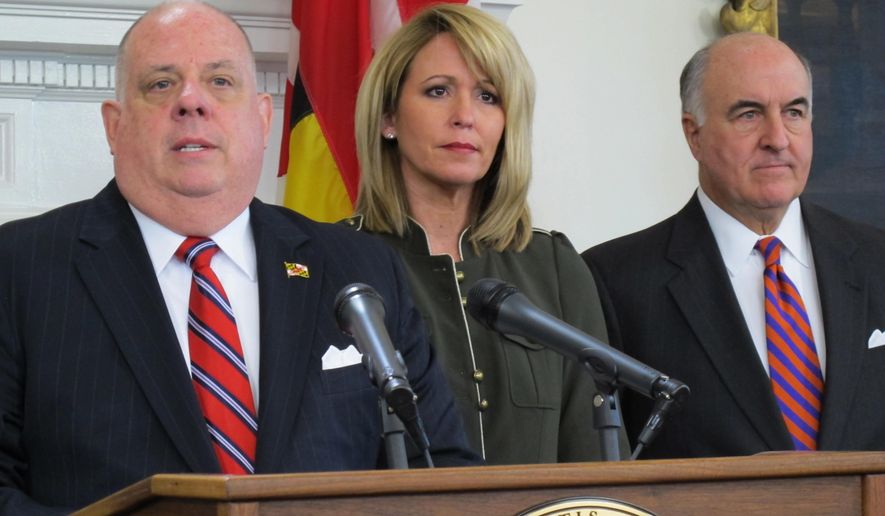ANNAPOLIS, Md. (AP) - Maryland Gov. Larry Hogan again proposed an alternative measure for paid sick leave Tuesday, saying a bill passed by the Democrat-led General Assembly that he vetoed was badly flawed and would harm small businesses.
In a preview of coming election-year political battles, Democrats expressed confidence that the veto by the Republican governor would be overridden.
Hogan, who faces re-election next year along with all 188 members of the legislature, is proposing to phase in sick leave over three years for businesses with 25 or more employees. The measure would require five days of paid sick leave for businesses with 50 or more employees next year and 40 or more employees in 2019. Maryland would then require paid sick leave for businesses with 25 or more employees in 2020.
The bill passed by the legislature would require five paid sick days for businesses with 15 or more employees next year.
“Marylanders deserve better than this, and fortunately there is still time for us to work together to correct all of the many terrible flaws of that piece of legislation so that we might be able to provide paid sick leave to more hard working Marylanders,” Hogan said at a news conference, where he released a task force report on the subject.
Del. Luke Clippinger, a Baltimore Democrat who sponsored the bill vetoed by the governor, called Hogan’s new proposal “window dressing” and “just a song and dance.”
“We’re going to override the governor’s veto,” Clippinger said. “We’re on the right side of this issue. This has been an emergency for 700,000 Marylanders who are covered by this bill for years. The fact that he’s only just realizing that now is an absolute shame.”
Both houses would need a three-fifths vote to override the veto, or 85 votes in the House and 29 in the Senate. The bill passed the House 87-53 and 29-18 in the Senate earlier this year.
Hogan, who proposed a separate bill earlier this year that did not advance, also wants to pass a bill in tandem with his new proposal to create a $100 million tax incentive to help offset costs for small businesses.
Hogan also criticized the bill that lawmakers passed because it would require employees to inform employers of their reasons for being sick. Hogan said that puts employees at risk of revealing sensitive medical information relating to domestic violence or sexual assault. But Clippinger said advocates who have been working with lawmakers for years on the bill have not raised those concerns.
Mike O’Halloran, the Maryland and Delaware director of the National Federation of Independent Business, said while the group appreciates Hogan’s efforts, the bill he outlined Tuesday “still creates uncertainty for the small business community.”
“The bill certainly blunts the impact of House Bill 1, but small businesses prefer that the government not interfere with their ability to hire and attract a well-qualified workforce,” O’Halloran said.
Supporters of Clippinger’s bill said Hogan’s proposal doesn’t go far enough. They criticized it for including an opt-out provision, though Hogan aides described it as a hardship waiver.
“This toothless legislation is just the Governor’s latest attempt to deny hundreds of thousands of hardworking Marylanders the ability to earn sick leave,” said Caryn York, of Jobs Opportunities Task Force.
Doug Mayer, a Hogan spokesman, said the waiver would only last two years and companies would need to reapply.
“The governor supports paid sick leave and expanding these benefits, but we’re not going to do it by shutting down peoples’ businesses and laying people off,” Mayer said.




Please read our comment policy before commenting.